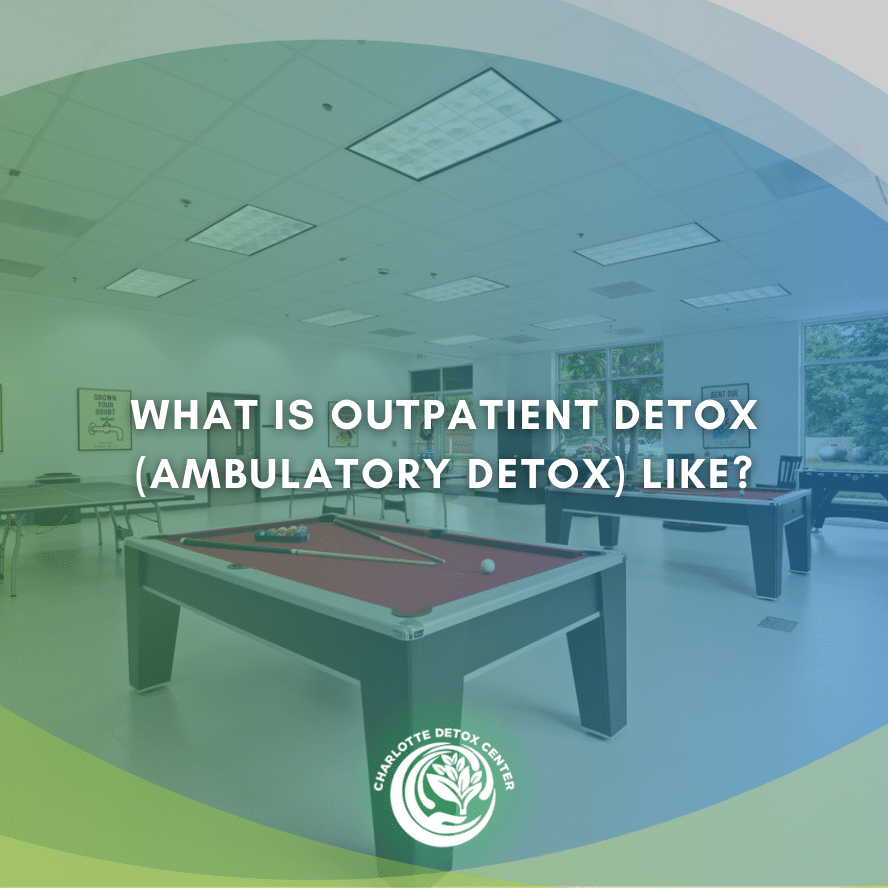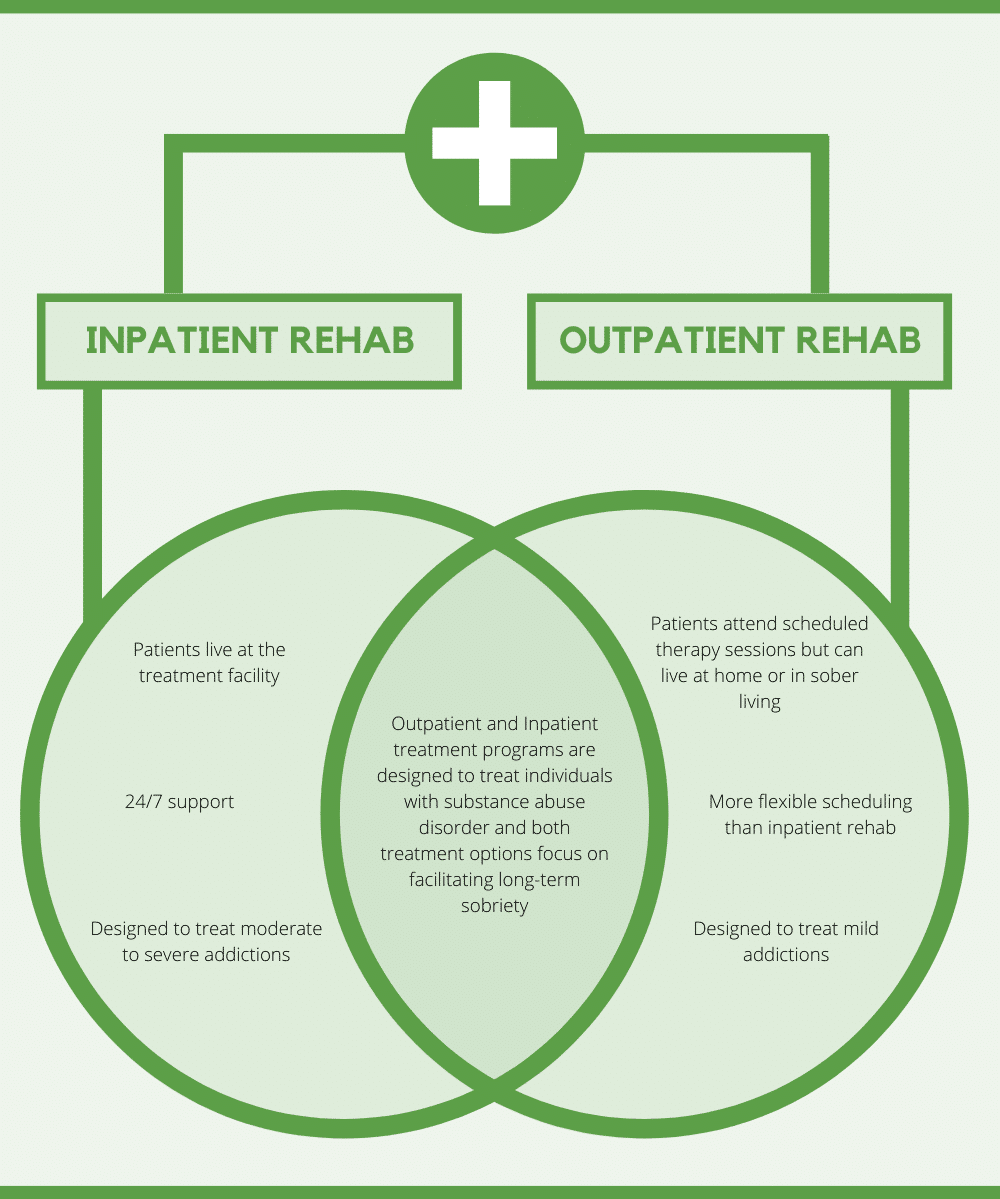What is Outpatient Detox (Ambulatory Detox) Like?

Medically Verified: 2/1/24
Medical Reviewer
Chief Editor

All of the information on this page has been reviewed and verified by a certified addiction professional.
The first step of the addiction treatment process involves detoxing from drugs and alcohol. It is best to do this with professional medical assistance and is usually provided on an inpatient basis. Outpatient detox centers in Charlotte, however, allow people to get medical support during the day while detoxing in their own homes in the afternoon and evening.
Outpatient detox, also referred to as ambulatory detox, is not for everyone. It is only recommended to individuals who have been assessed and found eligible for outpatient care. Anyone who needs a high level of supervision during detox will be transferred to an inpatient program.
If you have begun searching for the right treatment program for you, it’s important to be informed about all of your options. Here’s what you can expect during an outpatient detox program in Charlotte, NC.
What is Outpatient or Ambulatory Detox?
When most people think of detox, they think of a hospital-like setting where you spend time in your room detoxing from drugs and alcohol under close medical supervision. Although this is how many people detox, some people qualify for ambulatory detox.
Ambulatory or outpatient detox gives you the opportunity to take care of your regular responsibilities (work, childcare, etc) as substances leave your system. Each day, you return to the treatment facility for your scheduled visits, then you can return home and complete detox in a familiar environment.
Ambulatory detox is not recommended for people who:
- Are addicted to alcohol and/or benzodiazepines, both of which can cause life-threatening withdrawal symptoms[1]
- Have co-occurring mental health conditions that put them at risk of relapse during detox[2]
- Have physical health conditions that can complicate the detox process
- Do not have a sober and supportive home environment
- Have a long history of relapse or severe withdrawal symptoms
The Difference Between Inpatient and Outpatient Detox

During inpatient detox, you have access to medical and clinical support at all hours of the day and night. However, this also means you have to stay at the treatment facility until you are discharged from the program. You are not able to go home in the evenings, spend the night in your bed, or be around your loved ones.
Outpatient programs, on the other hand, allow you to complete all of your professional, educational, and family responsibilities while still getting help. Unfortunately, outpatient detox can be hard for some people. If you don’t separate yourself from your old environments and social circles, or if you don’t attend your scheduled appointments, you may experience a relapse.
Before choosing inpatient or outpatient detox, it’s best to have a full assessment done by a medical professional. He or she can tell you which level of care is right for you.
Benefits of Outpatient Detox
The primary benefit of ambulatory detox is the ability to get support from your friends and family because you are able to live at home. You are also able to continue working, going to school, or tending to your family responsibilities.
Another benefit of outpatient programs is that they are more affordable than inpatient. Since you are not receiving around-the-clock care, you aren’t responsible for housing costs or medical monitoring. Instead, you only pay for the appointments you are scheduled to attend and your medications.
What to Expect From Outpatient Detox in Charlotte, NC
If you enroll in an outpatient drug and alcohol detox program in Charlotte, you will be required to check in with the treatment facility on a daily basis. You will have scheduled appointments, usually in the morning, where you come to the facility, get your vitals checked by a nurse, speak with your doctor, and take your daily medication.
Depending on your situation, you may have additional sessions with a substance abuse counselor or therapy group. You will continue checking in each day until you are medically cleared and no longer in need of detox medications. Most outpatient detox programs last about 5-7 days, but this can vary depending on your individual needs.[3]
During outpatient detox, you will be encouraged to begin participating in recovery-based support groups. Support is a critical part of recovery — especially if you are receiving treatment on an outpatient basis. Having a support system can help you overcome any and all obstacles that come your way.
Before you are discharged from detox, the clinical team will help you figure out an aftercare plan so you can get the support you need to stay sober after detox. They may recommend outpatient rehab, individual counseling, or 12-Step groups.
Start a Drug and Alcohol Detox Program in Charlotte Today
If you qualify for outpatient detox, an ambulatory program in Charlotte, North Carolina can help you detox and retain control of your life. You will receive the medical care you need while remaining in charge of your personal recovery.
Getting sober is incredibly difficult, but our team at Charlotte Detox Center is here to help. Contact us today to learn more about our drug and alcohol detox programs.
References:
